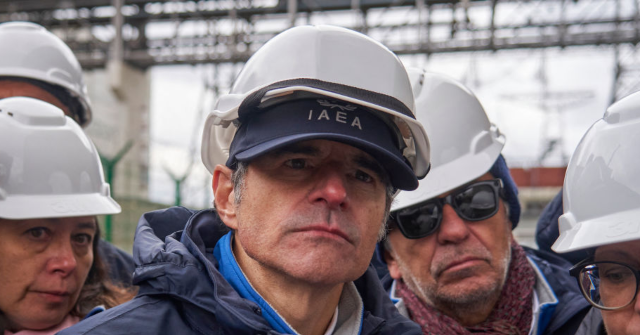A senior official with the International Atomic Energy Agency (IAEA), the United Nations’ nuclear watchdog body, is expected to land in Tehran on Monday for talks with the rogue Islamist regime — less than two months after Iran outlawed cooperation with the agency.
Iranian state media outlets, citing relevant regime officials, stated that one of the IAEA’s deputy directors is expected to engage in talks with representatives of the Iranian regime in pursuit of potential cooperation and assurances that Iran is still committed to the Non-Proliferation Treaty (NPT), which it signed. Iranian media did not name the official involved but emphasized that the individual is not a nuclear inspector and would not be allowed to visit any of the country’s illicit nuclear development sites.
Despite signing the NPT, extensive evidence indicates that Iran has routinely flouted any attempts to restrain its military nuclear development. The regime has especially focused on expanding its uranium enrichment capabilities — according to the IAEA, far beyond the amount required for any known civilian use. Iranian leaders insist that the country is only interested in pursuing peaceful nuclear development, but its regular threats to destroy neighboring Israel and its status as the world’s premier state sponsor of terrorism have for decades caused international alarm.
The IAEA formally condemned Iran via a resolution in June for violating the NPT. IAEA Director-General Rafael Grossi accused Iranian officials of hiding key enrichment activities from the agency and attempting to “sanitize” sites to hide the development.
Immediately after the passing of that resolution, the government of Israel launched “Operation Rising Lion,” a military engagement to eliminate Iran’s top terrorist leaders. President Donald Trump approved airstrikes shortly thereafter on Iran’s most notorious uranium enrichment sites at Fordow, Natanz, and Isfahan — strikes the U.S. government claimed effectively eliminated Iran’s enrichment capacity. The absence of IAEA inspectors in the country, however, means it remains unclear at press time exactly how damaged those sites are.
Shortly after the attacks, Grossi estimated that the bombings had “set back significantly” Iran’s uranium enrichment capacity. He emphasized, however, that without access to the sites, the U.N. agency could only make limited assessments.
The Iranian state media outlet PressTV confirmed, citing Iranian Foreign Minister Abbas Araghchi, that an IAEA deputy director would visit the country on Monday. He emphasized that the individual would not be allowed to visit nuclear sites, arguing that the presence of an IAEA official does not violate Iran’s promise to no longer cooperate with the agency.
“There is no plan for any inspection. We have not yet reached an agreement on a new framework [for cooperation] and until we reach this new framework, no cooperation will begin,” Araghchi reportedly said.
The foreign minister described the purpose of his or her visit as an attempt to “determine a framework for cooperation” — cooperation the region insisted was no longer possible mere weeks ago.
In similar remarks also publicized by PressTV, senior Iranian lawmaker Ebrahim Azizi insisted that the IAEA official visiting would “have no access to nuclear installations” and was only present in the country to seek “technical and expert-level talks” with Iran. Azizi insisted that the law blocking cooperation with the IAEA prevailed.
“According to the laws passed by Parliament, Iran will not let physical access to its nuclear facilities under any circumstances,” he explained. “Also, no inspector from the IAEA team or any other foreign organization will be allowed to be present at our country’s nuclear sites.”
The lawmaker called those limitations “final and irreversible.”
Iran’s Parliament, which serves as a rubber-stamp body for the whims of “supreme leader” Ayatollah Ali Khamenei, passed a law on June 25 that suspended all cooperation with the IAEA and banned IAEA inspectors from entering. Any future engagement, the law insisted, would require approval from Khamenei’s top advisory council. Iranian President Masoud Pezeshkian, who is subordinate to Khamenei, approved the law on July 2.
This week’s IAEA visit coincided with the publication of an interview with one of Araghchi’s top officials, Deputy Iranian Foreign Minister Majid Takht-Ravanchi, by the Japanese Kyodo News Agency in which he stated that Tehran may be open to limiting its enrichment program. Iranian officials, including Araghchi, repeatedly rejected any attempt to curb enrichment during five rounds of talks with the Trump administration this year that ended with the American bombing of nuclear sites on June 13.
“Our country can show flexibility regarding enrichment capacities and restrictions,” Takht-Ravanchi reportedly told Kyodo News, according to a translation by the Russian Tass News Agency. “Nevertheless, Iran will not agree to halt enrichment under any circumstances.”
“If the United States insists on zero enrichment, no agreement will be possible,” he nonetheless added.
Takht-Ravanchi also indicated that Iran would be willing to agree to a peace deal without the United States paying “reparations” for the destruction of the sites, undermining Araghchi’s repeated calls for the United Nations and the world generally to pressure Washington into paying Iran money to help it rebuild its illicit nuclear sites.
Follow Frances Martel on Facebook and Twitter.
Read the full article here


